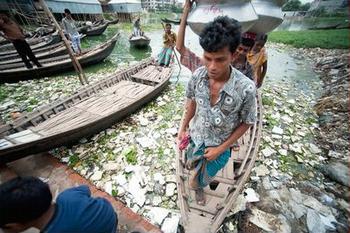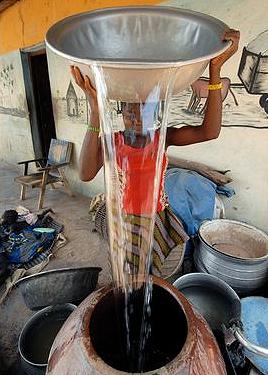Corruption, Climate Could Trigger Water Wars: UN Report
NEW YORK, New York, February 24, 2015 (ENS) – Cleaning up widespread corruption in the water supply industry is crucial to avert looming water conflicts born of desperation, warns a new United Nations report based on case studies in 10 countries.

Clean drinking water runs freely from a communal water faucet in Ndombil, Senegal, June 2006. (Photo by Evan Schneider courtesy UN)
“In many places … corruption is resulting in the hemorrhaging of precious financial resources,” siphoning an estimated 30 percent of funds earmarked for water and sanitation-related improvements, the report states.
The report, “Water in the World We Want,” warns that water supplies for 2.9 billion people in 48 countries will fall short of needs within 10 years, threatening “the stability and very existence” of some nations.
“Corruption at any level is not just a criminal act in its own right. In the context of sustainable development it could be viewed as a crime against all of humanity,” the report states, calling for clearly defined anti-corruption protocols enforced with harsh penalties.
Presenting their report at UN Headquarters in New York today, officials of UN University and the UN Office for Sustainable Development warned that unmet water goals threaten many regions and form a barrier to stable political systems, greater wealth and better health for all.

Contaminated water in Karial slum, one of the urban slums of Dhaka, the capital city of Bangladesh (Photo by Kibae Park courtesy United Nations)
Published in advance of the adoption of global post-2015 Sustainable Development Goals, or SDGs, set for this September, the report provides an in-depth analysis of 10 countries at all development levels: Bangladesh, Bolivia, Canada, Indonesia, Republic of Korea, Pakistan, Singapore, Uganda, Vietnam, and Zambia.
“The consequence of unmet water goals will be widespread insecurity creating more international tension and conflict, said lead author Bob Sandford, who chairs the Canadian Partnership Initiative in support of the UN Water for Life Decade.
“People do not have the luxury of living without water and when faced with a life or death decision, people tend to do whatever they must to survive,” the report states. “Changes in fundamental hydrology are likely to cause new kinds of conflict, and it can be expected that both water scarcity and flooding will become major trans-boundary water issues.”
Within 10 years, researchers predict 48 countries – 25 percent of all nations on Earth with an expected combined population of 2.9 billion – will be classified “water-scarce” (1,000 to 1,700 cubic meters of water per capita per year) or “water-stressed” (1,000 cubic meters or less).

Wayuu villagers in Pessuapa, Colombia make use of their diminishing water hole. Climate change has created water shortages in the indigenous Wayuu’s arid territory in northeast Colombia. (Photo by Gill Fickling courtesy UN)
And by 2030, expect overall global demand for freshwater to exceed supply by 40 percent, with the most acute problems in warmer, low-resource nations with young, fast-growing populations, according to the report.
“The positive message is that if we can keep moving now on water-related Sustainable Development Goals we can still have the future we want,” said Sandford, a water expert, who serves as director of the Western Watersheds Research Collaborative and as an associate of the Centre for Hydrology in the University of Saskatchewan’s Global Water Institute.
National governments must make sustainable advancements in water, wastewater, and sanitation management, supported by a dedicated and independent arm’s length water agency, a high level policy priority, Sandford and his co-authors advise.
They calculate that the world’s water and wastewater infrastructure maintenance and replacement deficit is building at a rate of US$200 million per year, with $1 trillion now required in the United States alone.

A young girl fills a family water pot from a well refurbished by UN Children’s Fund (UNICEF) to make clean water accessible to villagers and meet one of the Millennium Development Goals, Korhogo, Côte d’Ivoire, Mar. 2008 (Photo by Ky Chung courtesy UN)
As a result, another critical factor in achieving water security is the need for large new water-related investments.
The report recommends that the agriculture sector, which takes roughly 70 percent of world water supplies, and the energy sector, which takes 15 percent, be held accountable for greater efficiencies while transitioning to clean energy, including hydropower.
To finance its recommendations, the report says that $1.9 trillion in subsidies to petroleum, coal and gas industries should be redirected in stages to support water financing.
The estimated global cost to achieve post-2015 sustainable development goals in water and sanitation development, maintenance and replacement is US$1.25 trillion to $2.25 trillion per year for 20 years, a doubling or tripling of current spending.
The resulting benefits would also be large; the report estimates a minimum of $3.11 trillion per year, not counting health care savings and ecosystem service enhancements.
Written in association with the Global Water Partnership and Canada’s McMaster University, the report says continued stalling coupled with population growth, economic instability and disrupted climate patterns, could reverse hard-earned development gains and derail future sustainable development.
Copyright Environment News Service (ENS) 2015. All rights reserved.
http://ens-newswire.com/2015/02/24/corruption-climate-could-trigger-water-wars-un-report